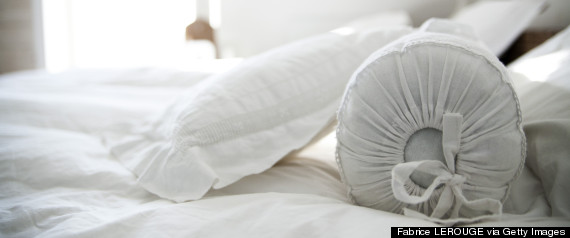So, here's the skinny on thread count: There is a warp going length and weft goes crosswise--on the same page so far? A warp might have a single ply (that's one single piece of fiber) or there could be two ply, meaning two singles put together--and if you put those into a single inch along with the crosswise (weft) threads, you might have 2 ply warp + 2 ply weft x # of threads in an inch. Let's say 40 threads per inch so that would be 4x40= 160. Now, if there is more plies in a single thread, the count goes up--still with me? But, what about 800 thread count? how can you cram 400 threads in an inch? I guess you could if you tried!
and then there is the quality of the cotton in the sheets--a whole new ball of thread questions!! The news report this morning was about just that question. Not all cotton is considered good quality--
Here is website info from Home & Garden (How Stuff is Made)
Fiber: the majority of fibers that make up sheets are cotton and you should look for a longer fiber. “Longer fiber is ideal, because when you spin the yarn, it gives it strength, which means less pilling.” Egyptian cotton, which is basically the standard of excellence, has a long fiber. Other good high-quality fiber options to look for are pima and supima, organic cotton, cotton-poplin, cotton-polyester and even bamboo.
Weave: According to Real Simple, the weave of your sheet “affects the way a sheet feels, the way it looks, its longevity, and its price.” There are many different kinds of weaves, but “a percale weave is the most prominent,” says Maher. “It’s a balanced weave, sort of like a basket weave, and it is a crisper or cooler feel.” Maher said another common choice is a sateen weave, which “has a bit of a softer feel to it, and a little warmer than percale.”
Numbers aren’t everything: Even if a sheet has a high thread count, that can be inflated by manipulating the sheet-making process with a low-quality construction or thread. As a general rule, buy above a 200-thread count sheet, and know that anything over an 800-thread count really doesn’t matter.
To help protect consumers from inflated thread counts, the Federal Trade Commission does its best to crack down on deceptive techniques and technology designed to increase thread count, as well as deceptive advertising and marketing.
Location, location, location: Not all thread is created equal. In an interview withNew York Magazine, Amanda Mettler, a textile buyer for Gracious Home, said “I can guarantee a 200 thread count from Italy is better quality than a 1,000 thread count from Pakistan.” France and Italy are regarded as some of the best sheet-makers in the business, even though the fiber they use isn’t always from those particular countries (such as Egyptian cotton).
Price matters: Maher is quick to remind people that “price and quality definitely go together. Bed Bath & Beyond or a Target 700-thread-count sheet is not really going to be the best quality.”
Finish is everything: Most sheets are “finished” with chemical processes to keep them from wrinkling or shrinking (look for words like “shrinkage control”). Though it’s nice not to have wrinkly sheets, try looking for organic cotton which should be chemical-free.






No comments:
Post a Comment